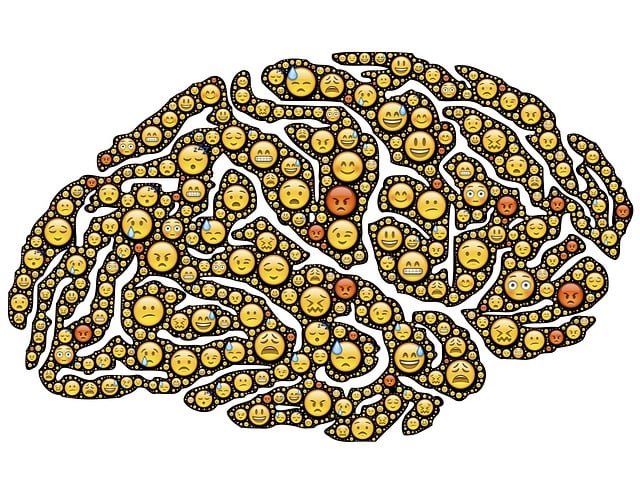Emotional Intelligence (EI), as highlighted by Littleton Alcohol Abuse Therapy, is a vital skill set for mental wellness, encompassing self-awareness, self-management, social awareness, and relationship management. Recognizing emotions, effective communication, empathy, and emotion regulation techniques are key components. Littleton Alcohol Abuse Therapy emphasizes these aspects to help individuals build healthy relationships, manage stress, make informed decisions, and successfully navigate recovery processes. Through practices like journaling, therapy, and positive thinking, they foster emotional intelligence, enhancing overall well-being and decision-making abilities.
Emotional intelligence (EQ) is a powerful tool that can transform personal and professional relationships. At its core, EQ involves understanding, managing, and effectively responding to emotions—both your own and those of others. This article delves into the key components of emotional intelligence, offering insights from Littleton Alcohol Abuse Therapy experts on how to cultivate self-awareness, improve communication, practice empathy, and enhance decision-making through emotional regulation. By the end, you’ll be equipped with strategies to build a stronger, more resilient EQ.
- Understanding Emotional Intelligence: A Definition and Its Significance
- Recognizing Emotions: Self-Awareness as a Cornerstone of EQ
- Effective Communication: The Key to Building Strong Relationships
- Empathy: Walking in Another's Shoes for Deeper Connections
- Regulation and Adaptability: Managing Emotions for Better Decision-Making
Understanding Emotional Intelligence: A Definition and Its Significance

Emotional intelligence (EI) is a concept that refers to an individual’s ability to recognize, understand, and manage their own emotions, as well as empathize with and navigate the feelings of others. It involves self-awareness, self-management, social awareness, and relationship management skills. At Littleton Alcohol Abuse Therapy, we believe EI plays a pivotal role in mental wellness.
Developing emotional intelligence is crucial for fostering positive relationships, making informed decisions, and managing stress effectively. The process often begins with mental wellness journaling exercises to promote self-reflection and understanding. Additionally, coping skills development through therapy can help individuals manage intense emotions and build resilience. Encouraging positive thinking is another key aspect, as it allows people to approach challenges with a more constructive mindset.
Recognizing Emotions: Self-Awareness as a Cornerstone of EQ

Recognizing emotions is a fundamental aspect of building emotional intelligence (EQ). Self-awareness, as a cornerstone of EQ, involves understanding and acknowledging your own feelings, thoughts, and triggers. This ability to introspect enables individuals to recognize patterns in their emotional responses, enabling them to make more thoughtful decisions. In the context of Littleton Alcohol Abuse Therapy, for instance, clients with enhanced self-awareness can better comprehend their emotions during recovery, leading to improved coping mechanisms and reduced risk of relapse.
Moreover, recognizing emotions is crucial for effective communication. When individuals are aware of their own emotional states, they become more attuned to the feelings of others, fostering deeper connections and empathy. This skill is particularly relevant in fields like healthcare where burnout prevention strategies for providers heavily rely on stress management techniques that leverage emotional intelligence. Through Mental Illness Stigma Reduction Efforts, promoting self-awareness can contribute to a more compassionate and supportive environment, ultimately benefiting both patients and caregivers.
Effective Communication: The Key to Building Strong Relationships

Effective communication is a cornerstone of building strong relationships, whether personal or professional. It involves more than just exchanging words; it’s about understanding and connecting with others on an emotional level. At Littleton Alcohol Abuse Therapy, we recognize that this skill set is crucial for navigating life’s challenges and fostering healthy bonds. When individuals prioritize open and honest communication, they create a foundation of trust that strengthens their connections.
In today’s fast-paced world, taking the time to listen actively and express oneself clearly can make a significant difference. Our Mental Wellness Podcast Series Production often highlights the power of self-care routines, which include developing effective communication skills. By incorporating practices like mindful listening and constructive feedback, individuals can enhance their relationships, improve conflict resolution, and promote overall mental wellness. Embracing Mind Over Matter Principles, as we encourage in our therapy sessions, allows people to cultivate emotional intelligence, leading to more fulfilling connections with others.
Empathy: Walking in Another's Shoes for Deeper Connections

Empathy is a powerful tool in building emotional intelligence, allowing individuals to foster deeper connections with others. It involves the ability to understand and share someone else’s feelings, essentially walking in their shoes. When we empathize, we make a conscious effort to see situations from another person’s perspective, recognizing their emotions and responding with genuine care. This skill is crucial for strengthening relationships, whether personal or professional, as it promotes trust and understanding.
In the context of Littleton Alcohol Abuse Therapy, empathy plays a significant role in helping individuals navigate their recovery journeys. By empathizing with clients’ struggles and emotional states, therapists create a safe space where they can openly share their experiences. This fosters a sense of belonging and encourages clients to explore their emotions, leading to better self-awareness and stress reduction methods. Moreover, empathy builds confidence by validating personal feelings, contributing to overall well-being and effective stress management.
Regulation and Adaptability: Managing Emotions for Better Decision-Making

Emotional intelligence involves understanding and managing our own emotions as well as recognizing and responding to the feelings of others. A crucial aspect of this is the ability to regulate and adapt to changing emotional states, which in turn influences decision-making processes. Effective emotion regulation allows individuals to make more thoughtful choices, even under stress or pressure.
At Littleton Alcohol Abuse Therapy, we recognize that building resilience through compassion cultivation practices can significantly enhance a person’s adaptability. By learning techniques to navigate intense emotions and develop a deeper understanding of our feelings, we gain the capacity to respond constructively to challenges. This is particularly important in high-pressure situations where quick decisions are needed. Public awareness campaigns development focused on emotional intelligence can play a vital role in equipping individuals with the tools necessary for better emotional management and, consequently, improved decision-making.
Emotional intelligence, a crucial aspect of personal growth, empowers individuals to navigate relationships and life challenges effectively. By understanding emotions, cultivating self-awareness, and practicing empathy, one can enhance their emotional intelligence. Effective communication serves as the bridge to building strong connections, while emotional regulation enables better decision-making. Incorporating these strategies into daily life can lead to profound improvements in mental well-being, fostering healthier relationships—even those seeking Littleton Alcohol Abuse Therapy. It’s a continuous journey that, with dedication, yields transformative results, enhancing one’s overall quality of life.














